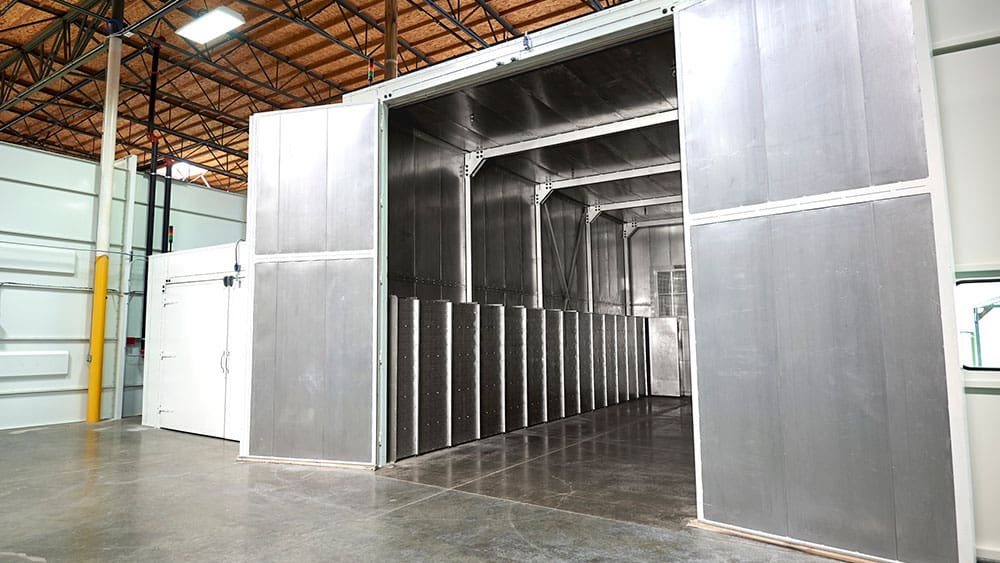
If you are in the market for an industrial oven, a gas burner is often the preferred choice over an electric heater because of the lower capital investment, smaller operational costs and established utilities within a facility. However, electric ovens have a distinct advantage over gas due to increased efficiency for low-temperature applications.
Several considerations must be taken when choosing between a gas and electric oven, as your decision will have a direct impact on your business’ financial and production capabilities. Here are four things to know about gas and electric ovens:
Small, low-end electric ovens are cheaper to purchase than gas ovens, and large, high-end electric ovens are also cheaper than their gas counterparts. But for the majority of mid-range industrial ovens, gas burners are cheaper to purchase and run than electric heaters. That is largely because electric ovens are indirect-fired, meaning the air is heated indirectly, as the burner is fired into a heat exchanger. Gas ovens are direct-fired — the burner is fired directly into the process air stream to heat it.
In recent years, the cost of gas in the U.S. has been less than the cost of electricity. This drives most industrial manufacturers to select gas ovens over electric ovens, as the operational cost of electricity is so much higher.
However, it is not uncommon for industrial facilities to have electricity but not gas service. The one-time cost of adding gas is typically less than the long-term cost of operating an electric oven. Many facilities also lack the established utilities to handle the high amp draw required to run an electric oven.
In 2018, JAS Powder Coating of Fort Lauderdale, Florida, replaced their existing gas oven with a 34-foot-long, gas-powered Batch Process Oven from Global Finishing Solutions (GFS). Over the past year, they have increased their throughput by 150 percent and decreased their fuel cost by $7,000. This shows that increased efficiency and cost savings can be realized even when comparing gas ovens.
Another factor to consider when comparing gas and electric ovens is explosion relief. Explosion relief is needed with a gas oven but not an electric oven. Since gas ovens are direct-fired, there is always the risk of an explosion. This risk is not present with indirect-fired electric ovens.
Incorporating explosion relief requires additional installation time and money. This expense is not associated with electric ovens.
Temperature control is superior in electric ovens compared to gas ovens. When the temperature in a gas oven dips to 140-150 degrees Fahrenheit, the burner cycles on and off, and it must be constantly relit. To keep the oven operational, the exhaust rate must be increased so that the oven heats more air, which lowers the temperature inside the oven. This makes the oven less efficient.
“With an electric oven, you can turn the temperature down as low as you want and you are still moving air,” said Ben Kinzel, GFS mechanical engineer. “With a gas oven, there is always a minimum temperature that you must maintain.”
Compared to the U.S., there are stricter code requirements in Canada for gas-fired equipment. Canadian officials require ETL-C listings for gas-fired ovens, but since a majority of GFS ovens are custom, they are not listed. That means third-party inspections are required in Canada to ensure code compliance for gas-fired ovens.
If low-temperature applications are the norm for your operation, an electric oven is the better choice because of the increased efficiency. Not requiring explosion relief also cuts equipment costs, as well as time during installation. The downside of electric ovens is that operational costs are high when curing products at high temperatures is needed, and most facilities are not constructed to withstand the large amp draw of an electric oven. Operational costs of gas ovens are relatively low, but explosion relief is needed, and they are not as efficient when running at low temperatures.
The decision on whether to choose a gas or electric oven typically comes down to whether a manufacturer needs an electric heater for low-temperature applications or only needs a small oven. If not, a gas oven is generally better in the long run.
Take a look inside Nautilus Abrasive Blasting & Powder Coating’s new Batch Process Oven:
One of the best ways to highlight your business is through a story that you can share across your online platforms. It humanizes your business and shows that your business can make a meaningful impact. Your testimonial would be used as a project profile on the GFS Booth Blog and can be shared on your website and/or social media channels.
Complete this form and we’ll be in touch to showcase your company.

Shop a variety of GFS aftermarket products, including booth protection products and mobile accelerated curing units. And enjoy the convenience of fast and free ground shipping throughout the contiguous United States.

Located at GFS’ headquarters in Osseo, Wisconsin, the Center for Excellence is an innovative facility featuring an automotive refinish training center, as well as a separate space dedicated to technical product training.

GFS is continuously searching for talented, ambitious individuals to join our team. We aim to provide our employees with every opportunity to make an impact on the company and find their niche along the way — weather in a production, field services or an office position.